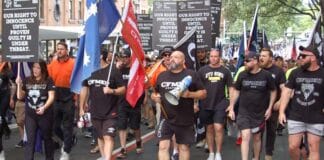A packed meeting of 250 NTEU members at Sydney University on 8 June voted to begin balloting for industrial action.
The union is currently negotiating a new enterprise bargaining agreement covering working conditions and pay for the next four years.
Prior to the meeting, university management had already been forced to back down from their proposal to scrap the 40/40/20 clause in the current agreement. This stipulates academic staff should have a workload of 40 per cent teaching, 40 per cent research and 20 per cent administration. Management wanted to force academic staff to individually negotiate their workloads with supervisors. Instead they now want to be able to appoint teaching only positions—a way to achieving the same goal of forcing some academic staff out of research.
They also want to scrap Scholarly Teaching Fellowships and Early Career Development Fellowships. These positions were won in bargaining in 2013 and offer one of the few paths out of casualisation.
Management also wants to be able to externally advertise professional staff positions without first internally advertising them. This will affect staff career progression.
They have also refused to agree on any of the NTEU core claims. The NTEU is arguing for a provision to prevent forced redundancies—important given the recent history of mass dismissals. The Provost, Stephen Garton, has said there will be redundancies as part of the impending university restructure.
Management is also resisting claims around casuals’ conditions including payment for all work undertaken, equal superannuation to that of on-going staff, access to resources, and paid sick leave.
The mass meeting is an encouraging sign that there is the mood to fight. Staff members are sick of the ever increasing workloads and the lack of consultation on changes at the university.
The anti-union laws mean that legally NTEU members now have to wait for the electoral commission to run a ballot on whether staff want to take industrial action and what kind of action they support. This will take at least six weeks. More than 50 per cent of members must return their ballot paper, and a majority of them must vote for industrial action.
UTS and UWS are also currently bargaining. Coordinated industrial action would really hit the university bosses and could begin to turn conditions around for the better.
By Vivian Honan





